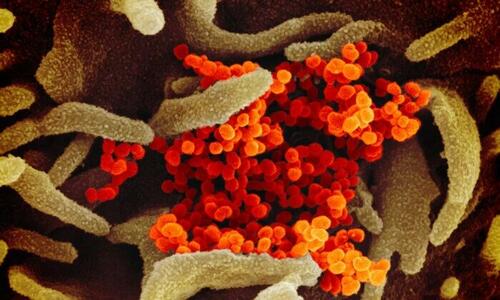
Authored by Zachary Stieber via The Epoch Times (emphasis ours),

People with a history of COVID-19 infection are better protected against common colds than people who received a COVID-19 vaccine, according to a new study.
Infection and vaccination triggered similar antibody responses in study participants, but T cell responses targeting endemic coronaviruses, which cause some common colds, were found only in people with past infection with COVID-19, which is caused by the virus SARS-CoV-2. The study was published in the journal Science Translational Medicine on June 12.
“Prior SARS-CoV-2 infection as compared to COVID-19 vaccination associates with lower incidence of disease from highly related but not identical coronaviruses, namely the ‘common cold’ coronaviruses,” Dr. Manish Sagar, a physician at Boston Medical Center and one of the researchers, told The Epoch Times via email.
The lack of protection conferred by vaccines may stem from them not including certain parts of the coronavirus genome, he added.
Researchers analyzed data from 501 people with past infection, about half of whom had received a vaccine; 1,463 people who received a full COVID-19 vaccine course and had no past infection; and 2,869 with no history of infection or vaccination.
Just two of the 275 people, or 0.7 percent, with past infection and no vaccination contracted symptomatic endemic coronaviruses, compared to 3 percent of people deemed fully vaccinated, the researchers found.
About 1.4 percent of the people with past infection who were vaccinated experienced common colds with symptoms, as well as 1.8 percent of the people with no exposure to SARS-CoV-2.
The initial results indicated that COVID-19 vaccination may increase the risk of contracting common colds, but adjustments made for the differences between the three groups showed that while vaccination did not protect against common colds, it did not increase that risk, the researchers said.
Data from the people was examined retrospectively. It came from people who presented to Boston Medical Center from Nov. 30, 2020, through Oct. 8, 2021, for clinical care.
Limitations of the paper included the possibility of misclassification of some people due to them possibly having contracted COVID-19 without symptoms while being counted in one of the groups without prior infection.
The work was funded by U.S. National Institutes of Health grants and funds from the Massachusetts Consortium on Pathogen Readiness. The only conflict of interest disclosed was one author having a financial interest in Quanterix, a company developing an antibody test.
May Help Improve Vaccines
The data from the paper may help researchers improve COVID-19 vaccines, the researchers said.
“New coronaviruses could emerge in the human population in the future, and our hope is that this study provides insight into how immunity against SARS-CoV-2 could protect against severe disease caused by these unknown future coronaviruses,“ Dr. David Bean, a researcher at the Boston University Chobanian & Avedisian School of Medicine and one of the authors, said in a statement. ”The goal of our study is to provide this information to the scientific community, and thus inform vaccine development now, before new coronaviruses have emerged.”
Because COVID-19 vaccines don’t work as well as hoped against the illness, some scientists have been working on pan-coronavirus vaccines that would protect against all coronaviruses.
Most currently available COVID-19 vaccines only contain the spike protein from SARS-CoV-2.
“Our studies suggest incorporation on other parts of the coronavirus genome, such as non-structural portions (something besides spike and nucleocapsid) may improve cellular responses,” Dr. Sagar said. “These cellular responses won’t necessarily prevent infection with highly related but not identical coronaviruses but it may reduce disease severity after infection.”
The researchers previously found that people who had recent infections to endemic coronaviruses were better off against COVID-19, suggesting that the immune responses triggered by the viruses helped protect against COVID-19 infection.
Another group of researchers said in a separate paper that the T cells produced when the body fights common cold viruses provided cross-protection against SARS-CoV-2.
Authored by Zachary Stieber via The Epoch Times (emphasis ours),

People with a history of COVID-19 infection are better protected against common colds than people who received a COVID-19 vaccine, according to a new study.
Infection and vaccination triggered similar antibody responses in study participants, but T cell responses targeting endemic coronaviruses, which cause some common colds, were found only in people with past infection with COVID-19, which is caused by the virus SARS-CoV-2. The study was published in the journal Science Translational Medicine on June 12.
“Prior SARS-CoV-2 infection as compared to COVID-19 vaccination associates with lower incidence of disease from highly related but not identical coronaviruses, namely the ‘common cold’ coronaviruses,” Dr. Manish Sagar, a physician at Boston Medical Center and one of the researchers, told The Epoch Times via email.
The lack of protection conferred by vaccines may stem from them not including certain parts of the coronavirus genome, he added.
Researchers analyzed data from 501 people with past infection, about half of whom had received a vaccine; 1,463 people who received a full COVID-19 vaccine course and had no past infection; and 2,869 with no history of infection or vaccination.
Just two of the 275 people, or 0.7 percent, with past infection and no vaccination contracted symptomatic endemic coronaviruses, compared to 3 percent of people deemed fully vaccinated, the researchers found.
About 1.4 percent of the people with past infection who were vaccinated experienced common colds with symptoms, as well as 1.8 percent of the people with no exposure to SARS-CoV-2.
The initial results indicated that COVID-19 vaccination may increase the risk of contracting common colds, but adjustments made for the differences between the three groups showed that while vaccination did not protect against common colds, it did not increase that risk, the researchers said.
Data from the people was examined retrospectively. It came from people who presented to Boston Medical Center from Nov. 30, 2020, through Oct. 8, 2021, for clinical care.
Limitations of the paper included the possibility of misclassification of some people due to them possibly having contracted COVID-19 without symptoms while being counted in one of the groups without prior infection.
The work was funded by U.S. National Institutes of Health grants and funds from the Massachusetts Consortium on Pathogen Readiness. The only conflict of interest disclosed was one author having a financial interest in Quanterix, a company developing an antibody test.
May Help Improve Vaccines
The data from the paper may help researchers improve COVID-19 vaccines, the researchers said.
“New coronaviruses could emerge in the human population in the future, and our hope is that this study provides insight into how immunity against SARS-CoV-2 could protect against severe disease caused by these unknown future coronaviruses,“ Dr. David Bean, a researcher at the Boston University Chobanian & Avedisian School of Medicine and one of the authors, said in a statement. ”The goal of our study is to provide this information to the scientific community, and thus inform vaccine development now, before new coronaviruses have emerged.”
Because COVID-19 vaccines don’t work as well as hoped against the illness, some scientists have been working on pan-coronavirus vaccines that would protect against all coronaviruses.
Most currently available COVID-19 vaccines only contain the spike protein from SARS-CoV-2.
“Our studies suggest incorporation on other parts of the coronavirus genome, such as non-structural portions (something besides spike and nucleocapsid) may improve cellular responses,” Dr. Sagar said. “These cellular responses won’t necessarily prevent infection with highly related but not identical coronaviruses but it may reduce disease severity after infection.”
The researchers previously found that people who had recent infections to endemic coronaviruses were better off against COVID-19, suggesting that the immune responses triggered by the viruses helped protect against COVID-19 infection.
Another group of researchers said in a separate paper that the T cells produced when the body fights common cold viruses provided cross-protection against SARS-CoV-2.
Loading…






